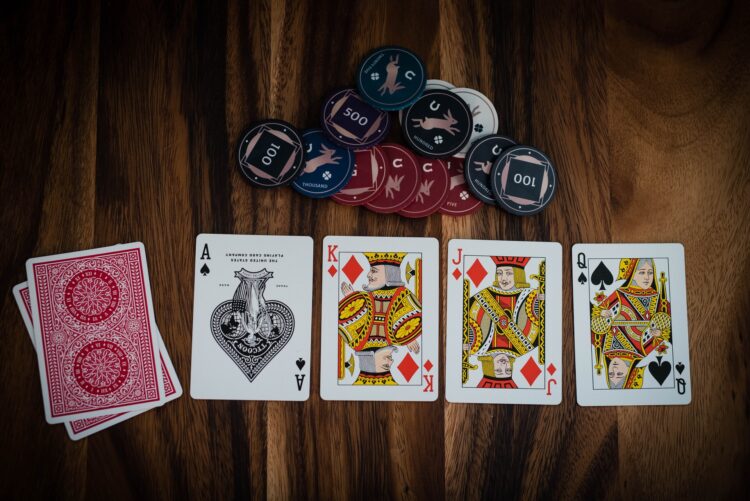While coronavirus means we’ll be stuck inside more than we’d like this winter, there are plenty of ways to keep ourselves entertained without trawling Netflix’s back catalog.
Games are a fantastic way to wind down when going out isn’t on the cards. They starve off boredom, let you connect with people in your house (or around the world if you choose a game online), and many of them come with the added benefit of keeping your mind sharp, too.
This winter re-learn some of your favorite games with a modern twist. We’ve listed the best places to get started below.
Poker

This classic game raises the stakes. The best part? It’s incredibly versatile – there are plenty of games that you can try out. To brush up on the basics, check out this great poker guide. We’ve walked you through some of the most common (and fun) versions of the game below.
- Five Card Stud: We recommend starting with this game. Essentially, the dealer shuffles and deals each player five cards. The player with the best hand wins. Note that this game is excellent for teaching poker basics, but kids can get bored quickly, so feel free to move on to Five Card draw if you’re entertaining children.
- Five Card Draw: Like Five Card Stud, the dealer shuffles and deals each player five cards. But Five Card Draw has a twist: players have the option to exchange up to three of their cards for new cards drawn randomly from the deck. As with all poker games, the person with the best hand wins.
- Texas Hold’Em: Five Card Stud and Five Card Draw are great places to find your feet, but once you’re comfortable with them, you’re ready for something more complicated. Texas Hold’Em begins differently: each player gets two cards. The dealer then deals five cards face down on the playing table. The dealer turns over the ‘flop’ (three of the cards), and betting commences. The dealer turns over the fourth card, players bet, and then the fifth card is turned over before a final round of betting and the big reveal. Players can use all five cards to make the best hand available, and the player with the strongest cards wins.
Don’t worry about betting your hard-earned cash. Ease the pressure by playing with matches, marbles or even chocolate chips and marshmallows – which kids will love.
Chess

Before you roll your eyes, hear us out – chess isn’t that hard, and it’s a lot more fun than you think. The trick is to start smaller: chess expert Andy Trattner suggests playing ‘minigames’, or chess games where the objective isn’t to checkmate your partner. He recommends starting with the following:
- Bishops and Rooks: This is the perfect game if you’re teaching a young child. Remove all pieces except two bishops on one side and two rooks on the other. One player plays bishops, the other plays rooks, and whoever captures a piece first wins.
- Kings Opposition: Once you’ve mastered Bishops and Rooks, move on to King’s Opposition – this game simply pits one king against another. One side tries to get their king to a particular space, and the other team tries to block the movement.
In changing the game’s objective, it becomes more accessible – and this might be the different perspective that you and your family need to enjoy chess.
Monopoly
Monopoly is a classic way to while away those long winter afternoons. Insider recommends inserting a bit of strategy into the game to keep it from getting frustrating:
Prioritize property. Buy everything you can, so you have more options as the game goes on. Buy the orange and red ones if possible (more people land on those than anywhere else).
Spend cash quickly. According to Business Insider’s experts, having money in the bank is one of the worst monopoly strategies.
Pay attention to the rule of three. For Insider’s experts: “always develop three houses on your monopolies as quickly as possible, and then aim to build three hotels on your properties. This will allow you to squeeze as much rent out of your properties as possible.”
Later in the game, do your best to stay in jail. Statistically, the board is more likely to be filled with hotels as the game progresses, so staying in jail will keep you from landing on other players’ monopolies.
Sardines
Another childhood throwback, sardines is a great way to brighten up an afternoon (or morning) when you’re stuck inside. Essentially, it’s reverse hide-and-seek. One person hides, and everyone else looks for them. Whenever another person finds them, instead of exposing the hider to the group, they join them – and once enough people have seen the hider, everyone is packed so tightly into the hiding spot that they look like sardines in a can!
Sardines is an excellent game if you have a large family and a good-sized playing space (fitting four adults somewhere sneaky is challenging to do, but one adult and several children can hide creatively). This game benefits from being thoroughly equipment free. We recommend turning off the lights to make people harder to see!
Charades
It’s probably been a few years since you’ve played this classic game, but charades is a crowd pleaser and benefits from needing little equipment – all you need is two bowls, pens, and scrap paper. Some people use a charades idea generator, but we think this game becomes more fun when you develop ideas to act out yourself.
The game’s premise is straightforward – divide up players into two teams, and have the teams write down ideas for the other team to act out. The ideas can be anything, but a word of caution (and sportsmanship) – don’t write down something that you’d struggle to act out yourself! The teams nominate members to go up and act out the charade. Time limits vary here, but most charades rules say that you have three minutes to act out the charade before passing it over to the other team.
We might be inside this winter, but there are still plenty of ways to keep busy. Happy playing!
 Hi Boox Popular Magazine 2024
Hi Boox Popular Magazine 2024



